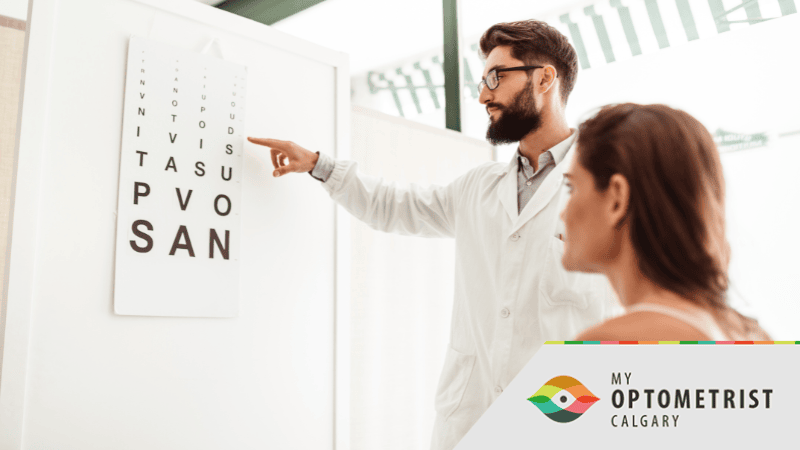
Eyesight is our predominant sense, yet approximately 74% of Canadians require vision correction. Many people over the age of 45 begin to develop presbyopia and people over the age of 65 tend to experience eye conditions that limit vision, such as cataracts and glaucoma. But many Canadian children also require vision corrections, with only 7 out of 10 Canadian children able to see clearly without corrective lenses. To make sure that you and your children can see properly, it is important to have regular eye exams and vision assessments. These optometry tests make sure prescriptions are up to date and any developing eye conditions are detected before vision is impaired.
Why And When To Have Vision Assessments
Refractive Errors And Vision Changes
For the average adult, vision changes requiring a prescription update typically occur anywhere between every year and every three years. How much a person's prescription needs to be updated can be variable and will depend on the eye conditions or refractive errors they have. For example, some people with myopia (nearsightedness) and many people with presbyopia (gradually developing farsightedness often triggered by age) may experience vision changes due to refractive errors, while people with hyperopia (farsightedness) likely will not. In general, adults aged 19 to 64 should receive a vision assessment every 2 years unless they experience changes in their vision. Then they should have vision assessments every year.
Gradual Vision Changes Caused By Eye Conditions
Not all vision changes are caused by refractive errors. Some eye conditions can alter vision temporarily. For example, cataracts are a clouding of the crystalline lens that occurs when proteins break down in the lens and this condition limits how much light can enter the eye, altering vision. But cataracts can be surgically removed and vision can be restored. If cataracts develop slowly and surgery isn’t yet needed, a vision assessment can determine a prescription that corrects cataract impairment. If a person has cataracts, they will need to visit the optometrist once a year or more depending on how quickly the cataract is progressing. To learn more about cataracts, read Cataract Awareness Month: What Causes Cataracts?
Sudden Vision Changes
If you notice a sudden change in your vision, it is time to go for an eye exam and vision assessment regardless of when you had your last one. Sudden vision changes can be a sign that something is wrong. If the vision change is severe (for example if you experience dark spots in your vision, lots of floaters, flashing lights, or other abnormalities), visit your optometrist for emergency services as you may be experiencing retinal detachment.
Vision Assessment At My Optometrist
Whether your vision is blurry or you’re due for an eye exam, My Optometrist has you covered. At every My Optometrist location, we offer comprehensive eye exams that include vision assessment and our staff can help you find frames if you require a new eyeglass prescription. By scheduling regular eye exams with our dedicated staff, your prescription will stay up to date and any developing eye conditions can be caught in their earliest stages so you can receive immediate treatment. To book an eye exam with one of our eye doctors, contact My Optometrist at one of our three locations at Health First in SE Calgary, Sunridge in NE Calgary, or Three Hills, AB. You can also call us or fill out the online contact form.
FAQ
Q: What are the different types of eyeglass lenses?
A: Everyone receives their own, personalized prescription designed to correct their vision, but in general there are single-vision lenses and bi-focal or multi-focal lenses. To learn which ones may work best for you, read Vision Health Month: Choosing The Right Eyeglasses For Optimal Vision.
Q: Is there a difference between a vision assessment and an eye exam?
A: Yes. A vision assessment can be done by a trained screener and does not require an optometrist or ophthalmologist to conduct the test. Vision assessments only determine what prescription you may need for lenses and do not assess any other aspects of your eye health. A comprehensive eye exam can only be performed by an optometrist or ophthalmologist and evaluates both the internal and external parts of the eye to detect common eye diseases. At My Optometrist, we perform both vision assessments and eye exams at the same time so that we can ensure you can see well and your eye health is properly cared for.
Q: What happens at an eye exam?
A: A comprehensive adult eye exam (for those between 19 and 64 years of age) at My Optometrist Calgary includes:
- A review of your past and present eye and general health issues, as well as your family history.
- A discussion of your visual needs at work or school, at home, and for leisure.
- Measurement of your current level of vision with and without your glasses or contact lenses, and determination of your prescription.
- Assessment of your ability to move and use both eyes together.
- Measurement of the pressure inside of your eyes.
- A visual field assessment to measure your peripheral vision
- Careful examination of the health of your eyes inside and outside. Drops to dilate your pupils may be recommended and administered.
- A photograph of the back of your eyes.